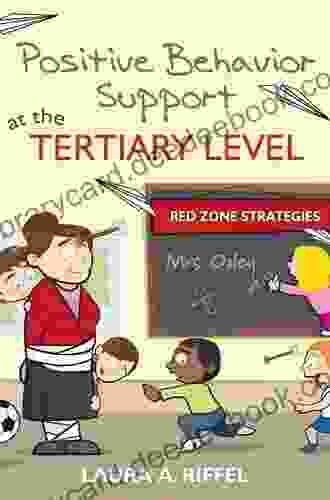Positive Behavior Support at the Tertiary Level

Positive Behavior Support (PBS) is an approach to supporting individuals with challenging behaviors by identifying the underlying causes of those behaviors and developing strategies to address them. PBS has been shown to be effective in reducing challenging behaviors and improving the quality of life for individuals with disabilities.
PBS is based on the principles of positive reinforcement and social learning. Positive reinforcement involves providing positive consequences for desired behaviors, while social learning involves observing and imitating the behavior of others. PBS interventions are designed to teach individuals new skills, provide them with opportunities to practice those skills, and support them in making positive choices.
PBS is a collaborative process that involves the individual with challenging behaviors, their family, their educators, and other professionals. The PBS team works together to develop a plan that addresses the individual's specific needs. The plan may include a variety of strategies, such as:
4.8 out of 5
| Language | : | English |
| File size | : | 3120 KB |
| Text-to-Speech | : | Enabled |
| Screen Reader | : | Supported |
| Enhanced typesetting | : | Enabled |
| Word Wise | : | Enabled |
| Print length | : | 291 pages |
- Functional behavior analysis (FBA) to identify the underlying causes of challenging behaviors
- Positive reinforcement to encourage desired behaviors
- Social skills training to teach individuals how to interact with others in a positive way
- Environmental modifications to make the environment more supportive
- Crisis prevention and intervention strategies to prevent challenging behaviors from escalating
PBS is an effective approach to supporting individuals with challenging behaviors at the tertiary level. PBS interventions can help individuals to learn new skills, improve their social interactions, and reduce their challenging behaviors. This can lead to improved academic performance, increased independence, and a better quality of life.
PBS has a number of benefits for individuals with challenging behaviors, including:
- Reduced challenging behaviors
- Improved social skills
- Increased academic performance
- Increased independence
- Improved quality of life
PBS is also beneficial for the families and educators of individuals with challenging behaviors. PBS can help to reduce stress, improve relationships, and create a more positive home and school environment.
Implementing PBS at the tertiary level can be challenging. Some of the challenges include:
- Lack of awareness of PBS
- Lack of training and resources
- Resistance to change
- Time constraints
- Large class sizes
Despite these challenges, PBS can be successfully implemented at the tertiary level. With careful planning and collaboration, the benefits of PBS can outweigh the challenges.
The following steps can be used to implement PBS at the tertiary level:
- Gain support from key stakeholders. The first step is to gain support from key stakeholders, such as administrators, faculty, and staff. This can be done by providing information about PBS and its benefits.
- Develop a PBS team. The PBS team should include the individual with challenging behaviors, their family, their educators, and other professionals. The team should work together to develop a PBS plan that addresses the individual's specific needs.
- Conduct a functional behavior analysis (FBA). An FBA is a process of gathering information about the individual's challenging behaviors. This information can be used to identify the underlying causes of the behaviors and develop strategies to address them.
- Develop a PBS plan. The PBS plan should include a variety of strategies to address the individual's challenging behaviors. These strategies may include positive reinforcement, social skills training, environmental modifications, and crisis prevention and intervention strategies.
- Implement the PBS plan. The PBS plan should be implemented consistently and with fidelity. This means that all members of the PBS team should follow the plan as it was written.
- Monitor the PBS plan. The PBS plan should be monitored regularly to ensure that it is effective. The team should make adjustments to the plan as needed.
PBS is an effective approach to supporting individuals with challenging behaviors at the tertiary level. PBS interventions can help individuals to learn new skills, improve their social interactions, and reduce their challenging behaviors. This can lead to improved academic performance, increased independence, and a better quality of life.
Implementing PBS at the tertiary level can be challenging, but it is possible with careful planning and collaboration. The benefits of PBS can outweigh the challenges, leading to a more positive and supportive environment for all.
4.8 out of 5
| Language | : | English |
| File size | : | 3120 KB |
| Text-to-Speech | : | Enabled |
| Screen Reader | : | Supported |
| Enhanced typesetting | : | Enabled |
| Word Wise | : | Enabled |
| Print length | : | 291 pages |
Do you want to contribute by writing guest posts on this blog?
Please contact us and send us a resume of previous articles that you have written.
 Book
Book Novel
Novel Chapter
Chapter Reader
Reader Library
Library Paperback
Paperback E-book
E-book Magazine
Magazine Sentence
Sentence Shelf
Shelf Bibliography
Bibliography Synopsis
Synopsis Annotation
Annotation Scroll
Scroll Codex
Codex Classics
Classics Library card
Library card Biography
Biography Autobiography
Autobiography Reference
Reference Encyclopedia
Encyclopedia Dictionary
Dictionary Thesaurus
Thesaurus Character
Character Resolution
Resolution Card Catalog
Card Catalog Borrowing
Borrowing Stacks
Stacks Archives
Archives Research
Research Lending
Lending Journals
Journals Rare Books
Rare Books Literacy
Literacy Study Group
Study Group Dissertation
Dissertation Awards
Awards Book Club
Book Club Theory
Theory Textbooks
Textbooks Henry Mittwer
Henry Mittwer Justin Nordstrom
Justin Nordstrom Margaret J Anderson
Margaret J Anderson Andrew Joseph Keith
Andrew Joseph Keith Jaxon Grant
Jaxon Grant Rachel Abbott
Rachel Abbott Peter Michael
Peter Michael Willy Wo Lap Lam
Willy Wo Lap Lam Owen Hatherley
Owen Hatherley Emily Cook
Emily Cook Michael Dahl
Michael Dahl Roger Scruton
Roger Scruton Matt Forbeck
Matt Forbeck Kazuo Ishiguro
Kazuo Ishiguro Cindy Neuschwander
Cindy Neuschwander Daniel Horowitz
Daniel Horowitz Bonnie S Calhoun
Bonnie S Calhoun Clever Black
Clever Black Robert O Hara
Robert O Hara Teresa Tysinger
Teresa Tysinger
Light bulbAdvertise smarter! Our strategic ad space ensures maximum exposure. Reserve your spot today!
 Mark MitchellFollow ·9.1k
Mark MitchellFollow ·9.1k Isaac AsimovFollow ·14.7k
Isaac AsimovFollow ·14.7k Ernest HemingwayFollow ·19.9k
Ernest HemingwayFollow ·19.9k Gabriel Garcia MarquezFollow ·5.1k
Gabriel Garcia MarquezFollow ·5.1k Alex ReedFollow ·19.3k
Alex ReedFollow ·19.3k Jermaine PowellFollow ·8.9k
Jermaine PowellFollow ·8.9k Jackson HayesFollow ·2.6k
Jackson HayesFollow ·2.6k Gilbert CoxFollow ·9.1k
Gilbert CoxFollow ·9.1k

 Braden Ward
Braden WardPopular Classical Carols of All Time for Beginner Trumpet...
Christmas is a time...

 Galen Powell
Galen PowellDark Secrets Unraveled: Exploring the Enigmatic Dark 15
In the depths of the...

 Michael Chabon
Michael ChabonDino Mike and the Living Fossils: Unlocking the Secrets...
In a world teeming...

 Henry Green
Henry GreenThe Enchanting World of Jeevan: A Journey Through the...
In the realm of children's...

 Kirk Hayes
Kirk HayesWho Did It First: A Comprehensive History of Human...
Innovation is the...
4.8 out of 5
| Language | : | English |
| File size | : | 3120 KB |
| Text-to-Speech | : | Enabled |
| Screen Reader | : | Supported |
| Enhanced typesetting | : | Enabled |
| Word Wise | : | Enabled |
| Print length | : | 291 pages |














